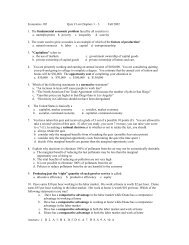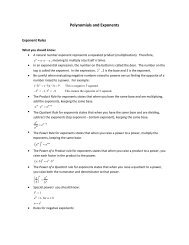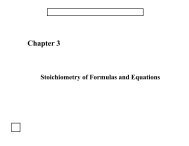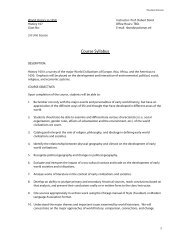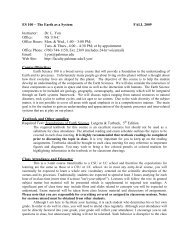Thomas Hobbes
Thomas Hobbes
Thomas Hobbes
You also want an ePaper? Increase the reach of your titles
YUMPU automatically turns print PDFs into web optimized ePapers that Google loves.
1 <strong>Thomas</strong> <strong>Hobbes</strong> – Part One<br />
1588 – 1679<br />
The Leviathan<br />
2 Important Names, Terms and Concepts<br />
• <strong>Thomas</strong> <strong>Hobbes</strong><br />
• Empiricism<br />
• Materialism<br />
• Imagination<br />
• Memory<br />
• Time<br />
• Infinite versus finite<br />
3 <strong>Thomas</strong> <strong>Hobbes</strong><br />
• <strong>Thomas</strong> <strong>Hobbes</strong> (1588 – 1679 ) was born in London and he went to Oxford<br />
University. <strong>Hobbes</strong> was interested in Political Philosophy and was trained in the<br />
Classics.<br />
• In 1651 <strong>Hobbes</strong> wrote the book that he is famous for called The Leviathan. <strong>Hobbes</strong><br />
argued that humans are essentially self interested and that a strong ruler was best to<br />
keep order and needed to avoid chaos.<br />
4 <strong>Thomas</strong> <strong>Hobbes</strong>’ s Empiricism<br />
• <strong>Hobbes</strong> argues that all our knowledge originates through the senses<br />
• <strong>Hobbes</strong> like Bacon and Descartes is also critical of the Empiricism taught in the Universities of his day and wants to set<br />
out a better theory<br />
• <strong>Hobbes</strong>’s theory is based on a form of Materialism that includes part of the new science put forth by Copernicus, Galileo<br />
and Kepler.<br />
• <strong>Hobbes</strong> points out Galileo who anticipated Newton’s first law of motion should be adopted<br />
• Newton’s First law of Motion<br />
• “An object in motion will tend to stay in motion and an object at rest will stay at rest unless the object is acted upon by an outside force”<br />
continue in motion<br />
• <strong>Hobbes</strong> says that most people accept the case of rest but do not yet accept the idea of an object’s being in motion eternally.<br />
5 Imagination and <strong>Hobbes</strong><br />
• <strong>Hobbes</strong> in discussing imagination uses the example of an afterimage to suggest that our<br />
imagination is nothing other than decaying sense.<br />
• Memory, according to <strong>Hobbes</strong> is “when we would express the decay, and signify that the sense is<br />
fading, old and past, it is called memory<br />
• <strong>Hobbes</strong> concludes that Imagination and memory are but one thing. The present is identified with<br />
Imagination as decaying sense and the past is indicated by memory of decaying sense.<br />
6 Imagination And Memory<br />
7 Experience and Memory<br />
• <strong>Hobbes</strong> says that when we combine memories together in a coherent way we form<br />
“experience.”<br />
• <strong>Hobbes</strong> puts forth the idea that Locke will call a simple and compound idea<br />
1
• <strong>Hobbes</strong> says that a simple imagination is one like a horse or a man<br />
• A compounded imagination would be if we conjoined together man and horse and came up with<br />
the idea of a Centaur ( Part horse and part man )<br />
8 Imagination and Dreams<br />
• <strong>Hobbes</strong> says that “ The imaginations of them that sleep are those we call<br />
dreams.”<br />
• <strong>Hobbes</strong> believed that if the body was cold a fearful dream would occur<br />
and if the body was overheated it would cause anger and an associated<br />
enemy might be in the dream.<br />
9 Dreams and Superstition<br />
• <strong>Hobbes</strong> believes that superstition and beliefs in fictitious creatures may be a result<br />
from people not being able to distinguish dreams from apparent visions and also<br />
things like fairies, ghosts and goblins.<br />
• He criticizes the schools for not eliminating these superstitions and in some instances<br />
taking advantage of the ignorance of the masses.<br />
10 Signs and Language<br />
• Understanding, according to <strong>Hobbes</strong>, is not only his will but also involves<br />
his concepts and thoughts.<br />
• A train of thoughts is a succession of ideas as one thought leads to<br />
another. <strong>Hobbes</strong> calls this Mental Discourse.<br />
• Mental Discourse is of two sorts.<br />
11 Mental Discourse<br />
• There are two kinds of mental discourse<br />
• Unguided thoughts are one’s that are ones that lack a design or end state<br />
• These are common with persons that let their mind wander<br />
• Regulated thoughts have a directing desire and a definite design.<br />
• These kinds of thoughts often become strong and permanent<br />
12 Mental Discourse<br />
13 Regulated Thoughts<br />
• <strong>Hobbes</strong> explains that when the mind is regulated by design it can be generalized as<br />
seeking. The train of regulated thoughts also can be divided into two kinds<br />
• Two Kinds of regulated thoughts<br />
• When we reason from effect to the cause<br />
• This is common to man and beast<br />
• When we reason from cause to effect<br />
• <strong>Hobbes</strong> says this type of thought is found only in man<br />
14 Seeking and Causation<br />
15 <strong>Hobbes</strong> On Time<br />
2
• <strong>Hobbes</strong> claims that “ The “present” only has a being in nature.”<br />
• <strong>Hobbes</strong> explains that the past has a being in memory only.<br />
• The future, according to <strong>Hobbes</strong>, is a fiction of the mind. <strong>Hobbes</strong> believes that we<br />
use our ability to predict to guess about what will happen in the future.<br />
16 <strong>Hobbes</strong> on the Infinite<br />
• <strong>Hobbes</strong> believes that the human understanding can only comprehend the<br />
finite.<br />
• “Whatsoever we imagine is finite.”<br />
• According to <strong>Hobbes</strong>, all discussion of the infinite is just an expression of<br />
having no conception of the thing in question.<br />
17 <strong>Hobbes</strong> on the Passions<br />
• Animals have two sorts of motion. <strong>Hobbes</strong> calls these two motions vital and<br />
voluntary motion.<br />
• Vital motion include such things as flow of the blood and breathing. Processes that<br />
occur without imagination<br />
• Voluntary Motion include speaking, and moving by will. These motions involve a<br />
starting point with imagination<br />
18 Two Kinds of Motion<br />
19 <strong>Hobbes</strong> discusses Language<br />
• <strong>Hobbes</strong> goes into great detail into the meaning of words and often<br />
discusses their Latin and Greek meanings.<br />
• Language is a tool that allows mankind to express his or her emotions.<br />
• <strong>Hobbes</strong> explains that a voluntary act proceeds from the will and that we<br />
are driven by the things we desire.<br />
20 Knowledge is of two kinds<br />
• There are two kinds of knowledge<br />
• Knowledge of fact<br />
• This includes sense and memory and corresponds to facts we have experienced in the present or the past<br />
• Science<br />
• Science is conditional and is required by the philosopher. <strong>Hobbes</strong> gives an example<br />
• “ If the figure shown to be a circle, then any straight line through the center shall divide it into two equal parts<br />
21 Knowledge of Fact as History<br />
• <strong>Hobbes</strong> identifies knowledge of fact with History. He then divides History<br />
into two kinds.<br />
• Natural history – History of facts of nature that are not dependent on man’s will<br />
• Civil History – History of voluntary actions of men in commonwealths<br />
22 Science involves books of demonstrations<br />
• <strong>Hobbes</strong> gives an extensive table to divide the different categories of<br />
3
Philosophy.<br />
• In <strong>Hobbes</strong>’s days Science was often referred to as Natural philosophy.<br />
• See text page 79 for the table.<br />
23 The divisions of knowledge<br />
24 Religion<br />
• Man is the only being that can have a religion because Man is curious and<br />
searches for the causes of things.<br />
• Man wanting to know the causes of good and evil are of ten anxious<br />
because the causes of good and evil are often invisible.<br />
25 Spiritual Substance<br />
• The ideas of spiritual or incorporeal nature cannot come from the<br />
imagination because it does not arrive through the senses.<br />
• <strong>Hobbes</strong> believes that is why men say that God is incomprehensible.<br />
• The worship of God is one of reverence<br />
4



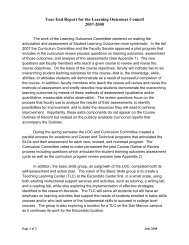
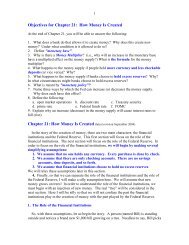
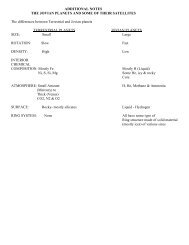
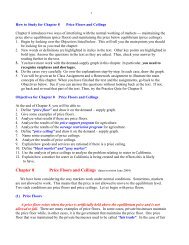
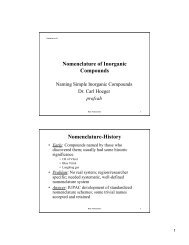
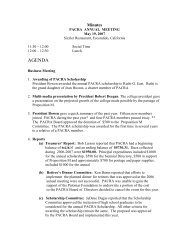
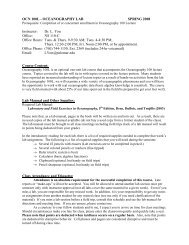
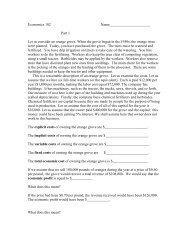
![Ch. 3 [pdf]](https://img.yumpu.com/49528659/1/190x245/ch-3-pdf.jpg?quality=85)
